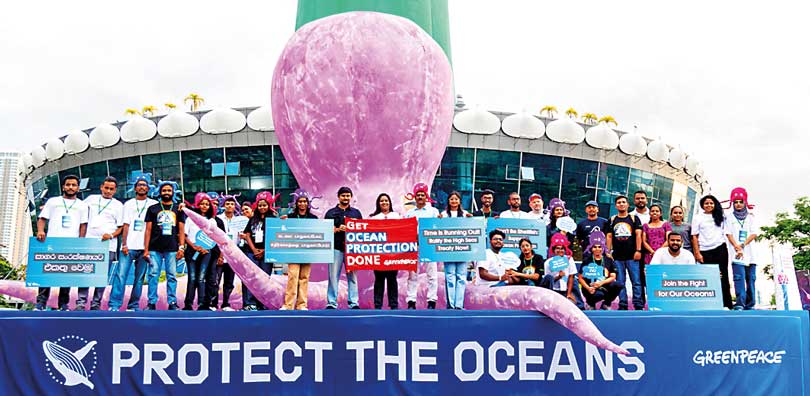Friday Feb 20, 2026
Friday Feb 20, 2026
Tuesday, 22 October 2024 02:17 - - {{hitsCtrl.values.hits}}


A new Greenpeace report titled “In Hotter Water: How the Global Ocean Treaty can boost climate action” launched on Sunday presents compelling evidence of the climate crisis’ disastrous impacts on the ocean and coastal communities, as well as solutions forward.
The release was timed with the opening of the 16th Conference of the Parties for the Convention on Biological Diversity (CBD COP 16) in Cali, Colombia.
The Sri Lanka report launch ceremony at the Lotus Tower, Colombo included interactive learning of challenges facing marine life due to climate change, family-friendly activities such as ocean-themed events including face painting, as well as an opportunity to meet the Mascot.
The report summarises scientific findings over the last five years which raise the alarm about ocean warming, coral bleaching, shifting marine species distributions, sea ice loss, sea level rise, and extreme weather events. Highlighting a recent study, the report warns that the oceans’ ability to absorb carbon dioxide may no longer be able to keep pace with human emissions. All these changes have come at a huge cost to the oceans themselves, and with profound consequences for billions of people worldwide.
Greenpeace South Asia Campaign Manager Avinash Chanchal Kumar said: “We must urgently take action and safeguard our best ally in the fight against climate change. Alongside drastically reducing carbon emissions as a matter of urgency, governments must ratify the Global Ocean Treaty that will allow the creation of large protected areas on the high seas. These would improve the resilience of marine ecosystems to climate change and maintain ocean carbon storage capacity and ultimately benefit us all.”
While the ocean and climate crises are worsening, governments have been dragging their feet on measures to effectively protect the oceans. To this day, less than 1% of the high seas – the largest habitat on Earth, comprising 64% of the world’s ocean – is fully or highly protected from human activities.
Greenpeace South Asia Campaigner in Sri Lanka Anita Rumeshi Perera said: “The ocean supports all life on this planet, and on the eve of the UN Biodiversity Conference, we have displayed a giant inflatable octopus mascot at the Lotus Tower in Colombo to engage with the public on ocean conservation benefits. We are now calling on the new President and future Government to make the signature and ratification of the Global Ocean Treaty one of their environmental priorities. Whereas climate change, heat waves, and floodings now impact everyday lives, we must act on straightforward multilateral solutions at hand.”
At the CBD COP 16, Greenpeace will also look to further improve biodiversity funding commitments for developing countries, synergies between biodiversity and climate policies, as well as other ocean and coastal community support priorities.
At least 60 countries must ratify the Global Ocean Treaty by the UN Ocean Conference of the Parties (COP) in June 2025 for the agreement to enter into force 120 days later. After ratification, governments must continue to prioritise ocean protection through rapid and effective implementation of the Treaty.
Key facts from the report “In Hotter Water: How the Global Ocean Treaty can boost climate action” include:
Bullets
Warming ocean waters mean the ocean is 1-2% less oxygenated than in the 1970s.
A global mass bleaching event began in 2023 – the second in 10 years – and by July 2024, 73% of the world’s corals had been exposed to enough heat to begin bleaching.
Sea levels are 21 cm higher than they were in 1900, and projected future ice loss from polar ice sheets and from glaciers in mountainous regions means that larger increases are expected by 2100, even under the lowest emissions scenario.
So-called “once in a century” extreme sea level events are predicted to be 20–30 times more frequent through the rest of the 21st century, exposing 1 billion people to their effects.
The ocean is the greatest carbon sink on Earth, holding over 50 times the amount of carbon in the atmosphere. The absorption of carbon dioxide by the ocean has so far provided a buffer against even more extreme impacts from the climate crisis, but this has come at a huge cost to the ocean. Ocean warming, acidification, and deoxygenation are causing the health of the ocean to drastically deteriorate. The ocean’s key role in the carbon cycle is therefore being compromised.